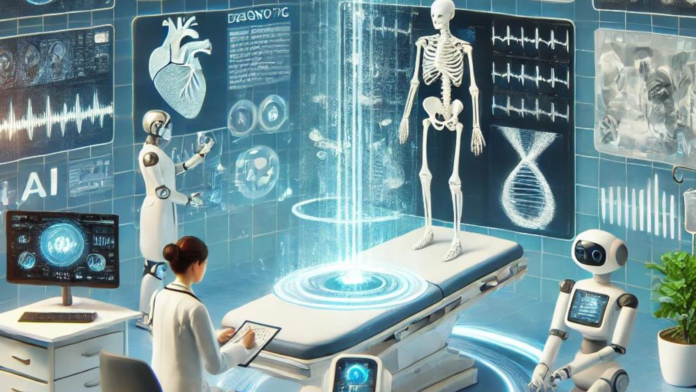Artificial Intelligence (AI) is transforming many industries, and healthcare is no exception. From diagnosing diseases to personalized treatment plans, AI has the potential to improve patient care in ways we’ve never seen before. As AI technologies continue to advance, they are becoming more integrated into healthcare systems, enhancing the capabilities of medical professionals and providing better outcomes for patients.
In this article, we’ll look at how AI is shaping the future of healthcare and how it can improve patient care.
1. Faster and More Accurate Diagnoses
One of the most significant ways AI is revolutionizing healthcare is through its ability to quickly analyze large amounts of data. AI algorithms can process medical images, lab results, and patient records to detect patterns and diagnose diseases faster and more accurately than traditional methods.
For example, AI tools are being used in radiology to detect early signs of cancer or other diseases that might be difficult to spot with the human eye. By improving the speed and accuracy of diagnoses, AI can help doctors start treatments sooner, leading to better patient outcomes.
2. Personalized Treatment Plans
AI can also help create personalized treatment plans based on a patient’s unique medical history, genetics, and lifestyle. Using data from past cases and medical research, AI systems can recommend treatments that are most likely to be effective for individual patients.
This approach is particularly useful in chronic diseases like diabetes or cancer, where treatments need to be carefully tailored to each patient’s condition. With AI, doctors can provide more precise, effective care.
3. Virtual Health Assistants
AI-powered virtual assistants are also helping to improve patient care by providing support to both patients and healthcare providers. Virtual health assistants can answer medical questions, schedule appointments, and remind patients to take their medications. These tools can reduce the workload on doctors and nurses while ensuring patients receive timely care.
For patients, virtual assistants make healthcare more accessible. They provide quick answers and support without the need for in-person visits, making it easier to manage health concerns from home.
4. Predictive Analytics for Better Outcomes
AI can analyze patient data and identify those at risk of developing certain conditions or complications. This predictive capability allows healthcare providers to intervene early and prevent more serious health issues.
For example, AI systems can predict which patients are at risk of hospital readmission after surgery, allowing doctors to take preventive measures. By using AI in this way, healthcare professionals can provide more proactive care, reducing the need for emergency treatments and improving patient outcomes.
5. Streamlining Administrative Task
In addition to improving direct patient care, AI can help healthcare organizations streamline administrative tasks. AI systems can automate tasks like patient scheduling, billing, and record-keeping, freeing up healthcare workers to focus on more critical aspects of patient care.
By reducing administrative burdens, AI can help healthcare systems run more efficiently, leading to faster and more organized care for patients.
Conclusion
The future of AI in healthcare is incredibly promising. With its ability to diagnose diseases, personalize treatments, and predict health risks, AI has the potential to transform patient care. As AI technologies continue to evolve, we can expect even more advancements that will improve healthcare for everyone.
Ultimately, AI’s role in healthcare is not to replace doctors or nurses but to assist them in providing better, faster, and more precise care, helping patients lead healthier lives.















